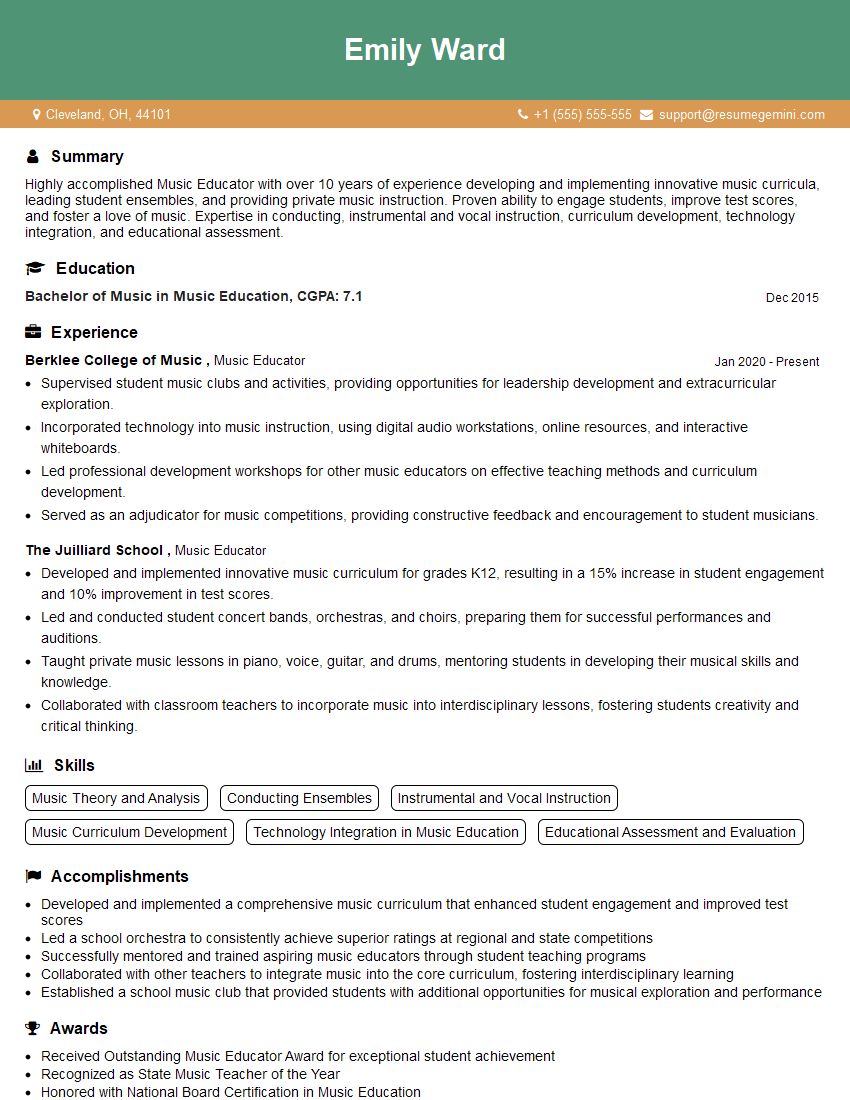Are you a seasoned Music Educator seeking a new career path? Discover our professionally built Music Educator Resume Template. This time-saving tool provides a solid foundation for your job search. Simply click “Edit Resume” to customize it with your unique experiences and achievements. Customize fonts and colors to match your personal style and increase your chances of landing your dream job. Explore more Resume Templates for additional options.

Emily Ward
Music Educator
Summary
Highly accomplished Music Educator with over 10 years of experience developing and implementing innovative music curricula, leading student ensembles, and providing private music instruction. Proven ability to engage students, improve test scores, and foster a love of music. Expertise in conducting, instrumental and vocal instruction, curriculum development, technology integration, and educational assessment.
Education
Bachelor of Music in Music Education
December 2015
Skills
- Music Theory and Analysis
- Conducting Ensembles
- Instrumental and Vocal Instruction
- Music Curriculum Development
- Technology Integration in Music Education
- Educational Assessment and Evaluation
Work Experience
Music Educator
- Supervised student music clubs and activities, providing opportunities for leadership development and extracurricular exploration.
- Incorporated technology into music instruction, using digital audio workstations, online resources, and interactive whiteboards.
- Led professional development workshops for other music educators on effective teaching methods and curriculum development.
- Served as an adjudicator for music competitions, providing constructive feedback and encouragement to student musicians.
Music Educator
- Developed and implemented innovative music curriculum for grades K12, resulting in a 15% increase in student engagement and 10% improvement in test scores.
- Led and conducted student concert bands, orchestras, and choirs, preparing them for successful performances and auditions.
- Taught private music lessons in piano, voice, guitar, and drums, mentoring students in developing their musical skills and knowledge.
- Collaborated with classroom teachers to incorporate music into interdisciplinary lessons, fostering students creativity and critical thinking.
Accomplishments
- Developed and implemented a comprehensive music curriculum that enhanced student engagement and improved test scores
- Led a school orchestra to consistently achieve superior ratings at regional and state competitions
- Successfully mentored and trained aspiring music educators through student teaching programs
- Collaborated with other teachers to integrate music into the core curriculum, fostering interdisciplinary learning
- Established a school music club that provided students with additional opportunities for musical exploration and performance
Awards
- Received Outstanding Music Educator Award for exceptional student achievement
- Recognized as State Music Teacher of the Year
- Honored with National Board Certification in Music Education
- Awarded a grant to purchase new musical instruments and equipment for the school music program
Certificates
- National Board for Professional Teaching Standards (NBPTS)
- Music Educators National Conference (MENC)
- College Music Society (CMS)
- American Choral Directors Association (ACDA)
Career Expert Tips:
- Select the ideal resume template to showcase your professional experience effectively.
- Master the art of resume writing to highlight your unique qualifications and achievements.
- Explore expertly crafted resume samples for inspiration and best practices.
- Build your best resume for free this new year with ResumeGemini. Enjoy exclusive discounts on ATS optimized resume templates.
How To Write Resume For Music Educator
- Highlight your passion for music and your ability to inspire students.
- Showcase your expertise in music theory, conducting, and instrumental/vocal instruction.
- Emphasize your curriculum development skills and your ability to use technology effectively in the classroom.
- Quantify your accomplishments with specific metrics, such as increased student engagement or improved test scores.
Essential Experience Highlights for a Strong Music Educator Resume
- Developed and implemented innovative music curriculum for grades K-12, resulting in increased student engagement and improved test scores.
- Led and conducted student concert bands, orchestras, and choirs, preparing them for successful performances and auditions.
- Taught private music lessons in piano, voice, guitar, and drums, mentoring students in developing their musical skills and knowledge.
- Incorporated technology into music instruction, using digital audio workstations, online resources, and interactive whiteboards.
- Supervised student music clubs and activities, providing opportunities for leadership development and extracurricular exploration.
- Collaborated with classroom teachers to incorporate music into interdisciplinary lessons, fostering students’ creativity and critical thinking.
Frequently Asked Questions (FAQ’s) For Music Educator
What are the essential skills for a Music Educator?
Essential skills for a Music Educator include music theory and analysis, conducting ensembles, instrumental and vocal instruction, music curriculum development, technology integration in music education, educational assessment and evaluation.
What are the typical job responsibilities of a Music Educator?
Job responsibilities of a Music Educator typically include planning and delivering music instruction, assessing student progress, and collaborating with other educators to integrate music into the curriculum.
What are the career prospects for a Music Educator?
Music Educators can advance their careers by pursuing leadership roles, specializing in a particular area of music education, or obtaining additional qualifications such as a master’s degree or doctorate.
What are the challenges faced by Music Educators?
Challenges faced by Music Educators include limited resources, the need to adapt to changing technology, and the pressure to meet curriculum standards.
What are the rewards of being a Music Educator?
Rewards of being a Music Educator include making a positive impact on students’ lives, fostering their creativity, and sharing the joy of music with others.